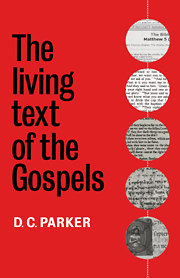Book contents
- Frontmatter
- Contents
- Preface
- List of abbreviations and frequently cited works
- 1 The theory
- 2 The materials
- 3 The practice
- 4 ‘As our Saviour taught us …’: the Lord's Prayer
- 5 The sayings on marriage and divorce
- 6 The story of the woman taken in adultery
- 7 Secrets and hypotheses
- 8 The endings of Mark's Gospel
- 9 The last three chapters of Luke
- 10 The development and transmission of the Fourth Gospel
- 11 From codex to disk
- 12 The living text
- Index of citations
- Index of Greek New Testament manuscripts
- Index of names and subjects
11 - From codex to disk
Published online by Cambridge University Press: 05 June 2012
- Frontmatter
- Contents
- Preface
- List of abbreviations and frequently cited works
- 1 The theory
- 2 The materials
- 3 The practice
- 4 ‘As our Saviour taught us …’: the Lord's Prayer
- 5 The sayings on marriage and divorce
- 6 The story of the woman taken in adultery
- 7 Secrets and hypotheses
- 8 The endings of Mark's Gospel
- 9 The last three chapters of Luke
- 10 The development and transmission of the Fourth Gospel
- 11 From codex to disk
- 12 The living text
- Index of citations
- Index of Greek New Testament manuscripts
- Index of names and subjects
Summary
I will not allow books to prove anything.
Jane Austen, PersuasionBefore attempting in these final chapters to explore the positions towards which our investigations have led us, it is necessary to summarise the conclusions which have so far been reached as a result of the examination of each problem or set of problems.
In Chapter 1, a basic question was asked, whether the task of textual criticism is to recover the original text. The answer was that it may be, but does not have to be. Examples were taken from Shakespeare and Mozart, to illustrate the way in which textual criticism has changed in recent years, from assuming its role to be the recovery of a single original and authoritative text to discovering an approach which takes as its starting point the recognition of the distinctive circumstances of particular documents and types of documents, and which pays more attention to the intrinsic value of successive versions. That such a change in perception has been one of the motivations for this book need hardly be stated.
The historical survey of the material in Chapter 2 led to the discovery of one set of circumstances surrounding the documents with which we are concerned. These circumstances are the physical characteristics of the copies containing them. Although this has hardly been touched on, it is an important point for consideration in these final chapters.
- Type
- Chapter
- Information
- The Living Text of the Gospels , pp. 182 - 202Publisher: Cambridge University PressPrint publication year: 1997



